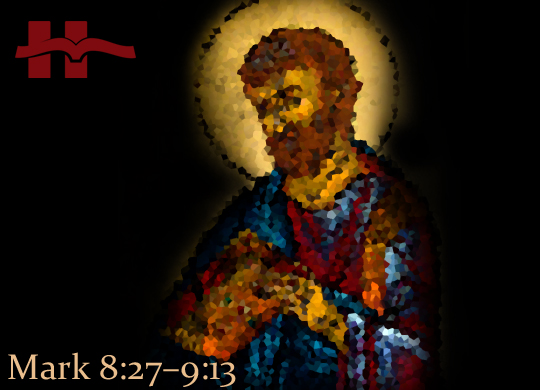Mark 8:27–9:13

The hope of future glory encourages disciples amidst present suffering while following Jesus.
“If anyone wishes to follow behind Me,
let him deny himself and take up his cross and follow Me!”
Mark 8:34
Allusions to who Jesus is have permeated the Gospel all along thus far; the crowds have often been amazed at Jesus’ words and deeds, and they have congregated in large numbers before him, but everyone—crowds and disciples—have failed to (fully) grasp the person of Jesus and all that that entails. Now Jesus delivers his first Passion Prediction (8:31), going beyond a description of his person: his suffering mission is now made clear.
And in this passage, Peter confesses that Jesus is “the Christ” (8:29). It appears that in his Passion account, Mark uses the term “Christ” as a royal designation: for instance, in the mocking of Jesus as King of the Jews (15:32, “Christ, the King of Israel”). The problem with this one-sided identification of Jesus as King was the inevitable and understandably unenthusiastic response of his followers to the idea of Jesus as Sufferer: kings are supposed to rule with power not be overwhelmed by it. Therefore an exclusively regal designation of Jesus, that does not take into account his suffering, is a deficient account of who he is. So Peter’s response, although true, is, at the very least, in need of clarification.
How can one go through such suffering successfully? What can keep us going?
The subsequent supernatural incident of Jesus’ Transfiguration (9:1–13) is a snapshot of the promised glory of God’s kingdom that Jesus talked about (8:38). This scene of great glory was a precursor to what was sure to happen in the future. The disciples were to persevere through suffering (promised for all who follow Jesus), by focusing on the glory that was coming (also promised to disciples).
In short, suffering must come before glory. The path to triumph is one of suffering. In the Transfiguration, we are given assurance of the promised glory, a snapshot to give us hope along the way. With that hope we are to press on, on this “Trip of Discipleship.”












 Abe Kuruvilla is the Carl E. Bates Professor of Christian Preaching at The Southern Baptist Theological Seminary (Louisville, KY), and a dermatologist in private practice. His passion is to explore, explain, and exemplify preaching.
Abe Kuruvilla is the Carl E. Bates Professor of Christian Preaching at The Southern Baptist Theological Seminary (Louisville, KY), and a dermatologist in private practice. His passion is to explore, explain, and exemplify preaching.